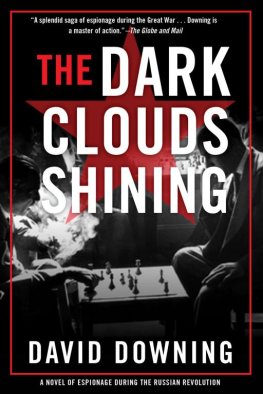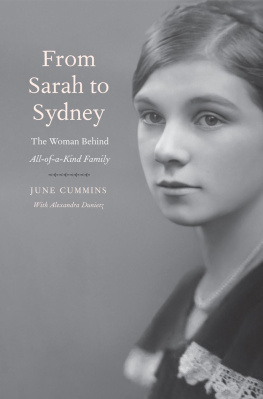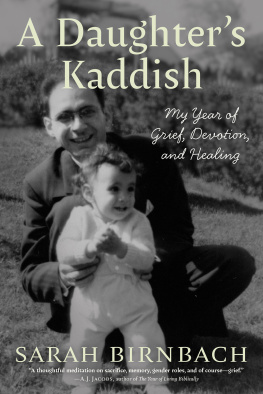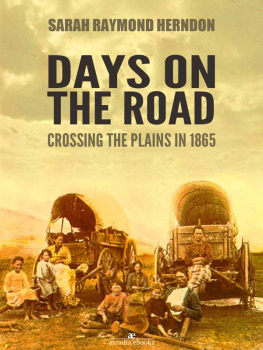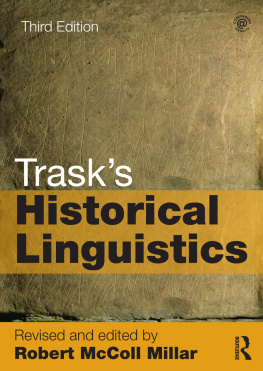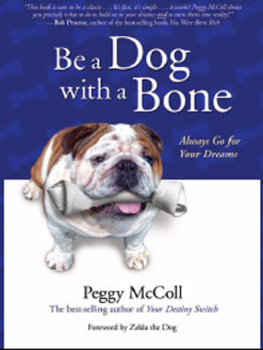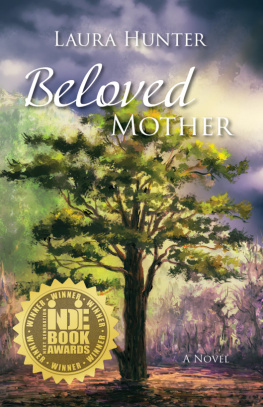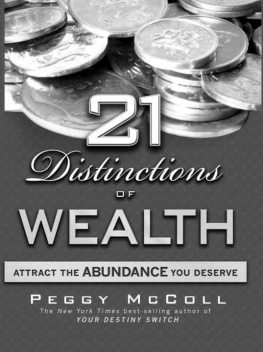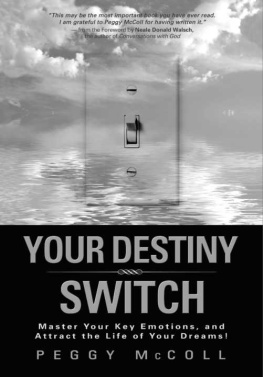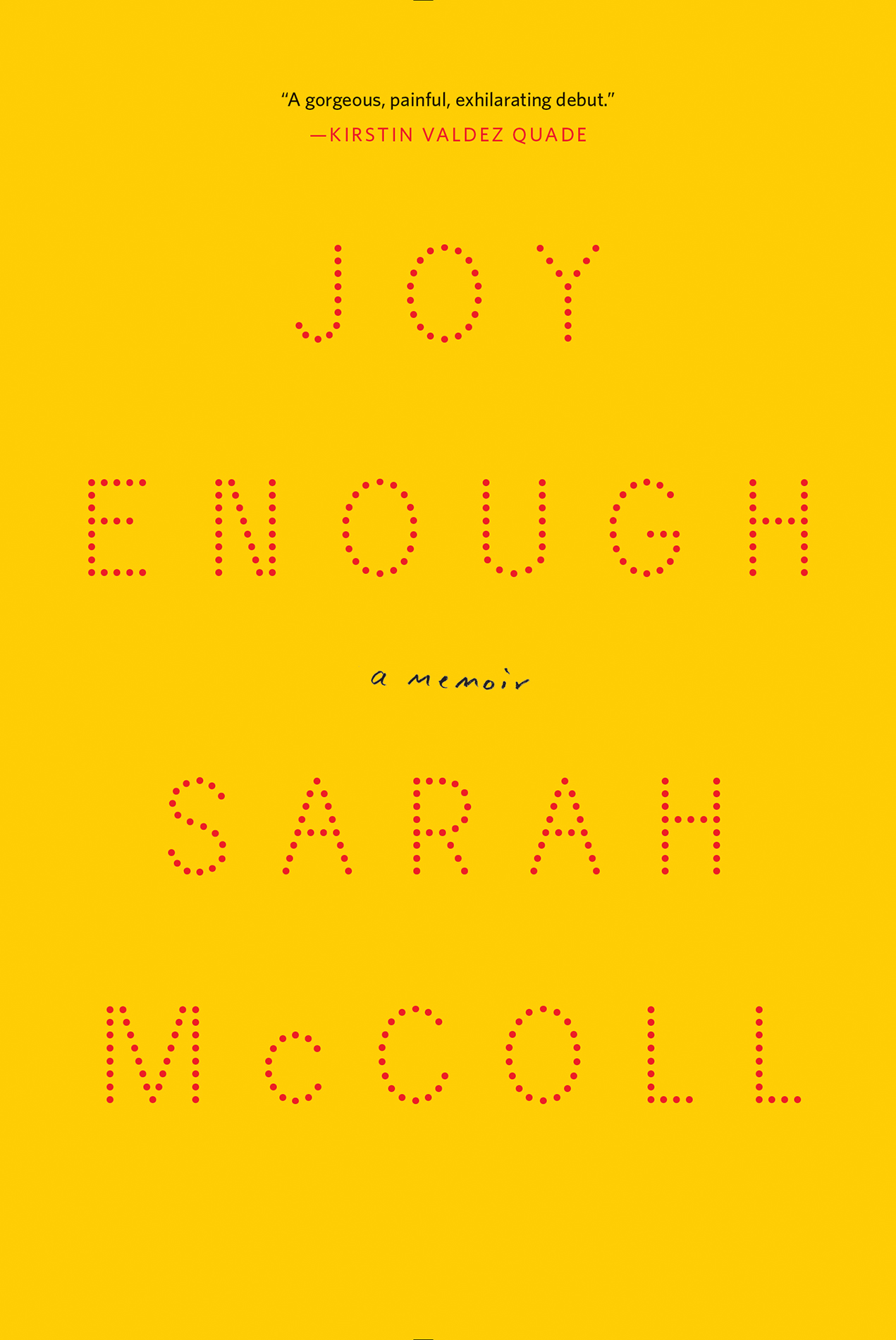Contents
Guide
Page List
SARAH McCOLL
JOY
enough
A Memoir

For Duncan, Katy, and Bliss
Some writers have a more defined sense of cause and effect. Plot. My sense of life is more moment, moment, and moment. Looking back, they accrue and occur to you at a certain time and maybe you dont know why, but you trust that they are coming back to you now for a reason. And you make a leap of faith. You trust you can put these moments together and create story.
Amy Hempel
Finally, the lessons of impermanence taught me this: loss constitutes an odd kind of fullness; despair empties out into an unquenchable appetite for life.
Gretel Ehrlich
The mere sense of living is joy enough.
Emily Dickinson
Contents
I LOVED MY MOTHER, and she died. Is that a story?
Story is giving a character a tangible desire, then putting things in her way. A writer I was falling in love with told me that. My desire is for my mother to live. More tangible, he says. My desire is not to forget. More tangible, he says.
Then my desire is for her to meet the next man I love, the one I keep now that I know a thing or two. My desire is for her to see my round silhouette in a summer dress, then to hold my baby in the delivery room. In winter, my desire is to make chili with the mixture of garden tomatoes and hot peppers she calls hell that Ive kept in the back of my freezer. Our desires are equally impossible: to freeze hell, to thaw it; to reverse time, to stop it. My desire is to have more of what I do not need, seconds of what has been my fair share: a fight, a car ride, a cup of coffee, ignored advice straight from the mouth of a grade A know-it-all.
Or none of this. My desire is preservation, to carry her lodged beneath my breast like a bone.
More tangible, he says.
H ER NAME WAS Allison, but her father called her Tune. My little petunia, he said.
It was like living in a green bowl, she said, the way the valley curved out a hollow at the foot of Mt. Greylock, and another ridge rose behind the barn and silo, enclosing their loneliness. The sphere at the end of the banister was the size of a boys face and about the right height. She leaned in with eyes closed to practice. Ridgeview Farm was in Western Massachusetts, five long, hilly miles outside of Williamstown along the cold Green River. She let the screen door bang on her way out to the pasture.
The air was manure and hay. It smelled of warm earth, of growing things. How do you round up cows? They are docile but slow moving, recalcitrant, with calves at their sides like small shadows. Maybe she called them by name or had the help of a dog, but somehow she herded those somnolent beasts into the barn where there were quiet stalls lined with stiff straw, and birds sat overhead in the eaves of the aluminum roof. Somehow she convinced them that was where they wanted to be.
It was not where she wanted to be. She felt the ache at every age, when she played house with a family of her own imagined children and performed from a rock to an audience of dumb daylilies. Her father shook the ice in his bourbon-and-gingers while he told jokes at a dinner table tight with seven plates of spaghetti. But the neighborhood was empty of anyone who wasnt a relative or slow-talking farmer. Just as her mother escaped to town each morning to swivel around an office, Tune rode a bike into thick woods. Under a slow-waving canopy, the light came through in patches. Mother and daughters longing was shared but unspoken.
When Tune was an adult and her own mother died, the parked cars overflowed onto the roads grassy shoulder, and four college presidents stood in the back of the church. Tune didnt cry. She had lost her mother a long time ago, she said, when she understood her mother was not the kind she had needed. This is one kind of mother and daughter.
She and I are another.
W HEN PEOPLE SAY, tell me about your mother, which they never do, I say she was my spiritual home.
So to say I miss herwhich I often did in the months following her death, because I did not have the language to express my roiling griefwas a polite way of calling myself a cosmic orphan, like a moon whose planet has fallen out of orbit.
My physical home: Sixth Avenue in Brooklyn, where I mark time by the trees, one in particular. The willow at Fifteenth Street is lush with long, falling maiden hair, its boughs rustling in the thawed breeze like underskirts across a polished wood dance floor. My husband moved out three months before my mother died, when the snow was still on the ground. Since then, I live alone.
But in the first weeks of spring, a heavy perfume hangs in the air on the corner of Fourteenth Street, and I stop on the sidewalk outside the Italian restaurant. Honeysuckle. The thick fragrance is unmistakable, but I cannot see the blooms, as if someone is calling my name who has not yet stepped into view.
W E REHEARSE OUR adult lives from the beginning. Mine was a game in the front yard. Into a bucket go sharp holly leaves, cedar chips from the flower beds, errant sticks, fistfuls of clovernever can find the lucky onesrippled pink blooms from the crape myrtles, and pale yellow honeysuckle blossoms. The bush forms a lush border between our house and the neighbors next door. One for me to eat; the stamen like a slide whistle and tongue touched to the drop of nectar. One for the bucket, and the blossom drifts to join the lawn detritus. The afternoon is a quiet expanse, the house emptied of my older brother and sister at school, my younger brother not yet born. I pause to watch doodlebugs dawdle along the pebbled surface of our front porch. Then into the kitchen, where my mother smears peanut butter on white bread, drips honey, and sinks a knife to cut fours. It is just the two of us, and I am out to make something, too. My bucket slides under the tap, there is a rush of hot water, and I stand as if at a cauldron with my witchs brew, stirring with a wooden spoon until there is a fierce swirl at the center. Lunch, she says, and my sandwich is on a blue and white plate. Stew! I announce, vainglorious at my own creation.
H ER FIRST MEMORY is of ants, of watching a single-file parade inside the trumpet of a daylily. Theirs is a bicentennial farm. For two hundred years a single family has pushed orchard apples through a food mill and lined the cellar shelves with canned pole beans, slipped from the barn roof, and died in labor. When my mother is older, she will bring her own diapered children to the top of the same hill and slide daylilies behind our ears, and many years after that, I will sneak away with my husband from a barbecue and lie down with him in the shadow of a tractor. But the first thing she remembers, she tells me, is the ants, their fluid line like pen ink, a whole city inside a bloom. It is June, and the sheets are snapping dry on the clothesline.
This is a memory of a memory, an image of my mothers childhood inside an image of my own, like nesting matryoshkas. When I hear about the ants, my mother is dropping me off at school. I am in fifth grade and fat, and Anne Murrays Greatest Hits is in the tape deck of her white Ford Taurus. I have a lavender backpack with neon zippers on my lap, and even I know it looks cheap. Its raining, and I am nearly late for the second bell, the drop-off traffic snaking around the block, and my mother wont stop talking.


